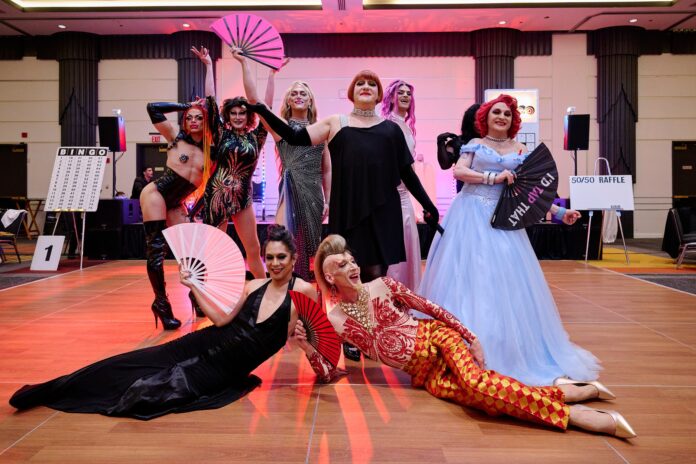AIDS Fund, the Philadelphia-based nonprofit known for starting the Philly AIDS Walk, is hosting their annual Black-Tie Gay Bingo event, where guests will enjoy a night of fun that also raises money.
“There’s not a lot of organizations who do what we do,” said Robb Reichard, executive director of AIDS Fund, who explained that the organization aims to make the biggest impact on the community by providing the kinds of support people can’t get elsewhere.
This year, the organization will honor longtime researcher Ron Collman and hopes to fund more than 300 microgrants to assist people living with HIV/AIDS. The grants help cover costs of housing, medical devices, health insurance premiums, and other basic needs.
The fundraiser will include a cocktail reception and silent auction, drag performances by local entertainers, and cash prizes for six rounds of bingo. The event’s entertainers are volunteers, and tips will support the fundraising goal. Reichard promises that attendees will only need to endure 15 to 20 minutes of speeches.
“We want people to have fun,” Reichard underlined. “But we want people to remember why we’re there.”
“With the evolution of AIDS Fund’s work, it is exciting to see how far we’ve come — but we see on a daily basis, how far we still need to go to make sure people have the things they need to live a long healthy life with HIV,” he said, underlining that systemic barriers to care often impact people’s ability to protect themselves or treat the disease.
“A financial crisis could become a health crisis,” he said, which is why AIDS Funds grants are so important.
Reichard noted that 1 in 5 new HIV infections in Philadelphia are in people under the age of 25. Young people, who didn’t live through the height of the epidemic, don’t always realize it’s still a lingering threat.
Reichard views Gay Bingo as a crucial reminder that HIV/AIDS is an ongoing crisis — not a problem of the past. He underlined his concern for what he called a “declining perception around the urgency of HIV.”
“Like a lot of people today, I was unaware that it was an ongoing health epidemic,” said Stella D’oro, who will be this year’s mistress of ceremonies, about her knowledge of HIV/AIDS before she first started volunteering at Gay Bingo. “It just didn’t seem like something you heard about anymore.”
“But the more I volunteered, the more I realized that there are still a lot of people living with HIV and AIDS,” she underlined, who are often living in poverty and might need just a few hundred dollars to make ends meet or continue their care.
“So I feel like the work that we’re doing — every ticket that we sell to an event, every dollar that somebody tips one of the drag queens — it really goes a long way,” she said.
“It’s really, really important for us to remember that HIV is not a problem in isolation,” said Collman, director of the Penn Center for AIDS Research (CFAR), who will be honored at this year’s event for his longtime work in the field.
“There’s an overlap between poverty, between substance use, between discrimination and HIV infection,” he said, underlining that housing and food instability, mental health challenges, and other issues can become barriers to care. “And so, really, the front here is integrating all of these pieces together and not thinking of HIV as a simple, single biological infection.”
He underlined that only a percentage of people who would benefit from PrEP are taking the medication and said it’s important to break down systemic barriers that get in the way of that access.
“In Philadelphia, there are currently about 20,000 people living with HIV and 30,000 in the region — which on one hand is great because these are all people who didn’t die like they would have 25 years ago,” said Collman. “But on the other hand, there are still about 400 new infections a year in Philadelphia. That’s more than one a day. And Philly is one of the top 50 hotspots in the US.”
Collman, whose training as a doctor is in pulmonology and critical care, first saw cases of HIV during his residency and started researching the connections between HIV and pneumonia.
“The crisis back then was so overwhelming. I’m not sure I can remember what I imagined the future would be,” he said. “I think that for many of us, it was just — put one foot in front of the other and try and push the field forward with treatments, with prevention, with more effective care.”
Collman now oversees CFAR, which is home to more than 100 faculty members who conduct HIV/AIDS-related research across various disciplines. The Center helped accelerate HIV/AIDS research through funding, catalyzing new collaborations, recruiting new researchers, offering training, and providing research services to assist that work.
One of CFAR’s researchers, who was working on an AIDS vaccine, recently won a Nobel Prize for research on mRNA technology — which was used to develop COVID vaccines. Another researcher studying potential AIDS vaccines developed a new generation of cancer therapies.
“So the science can have lots and lots of different positive impacts — even if it doesn’t get to the result that we wanted,” he said.
“What I love about what I do as the director of CFAR is that I’m able to be the advocate for people to help them in pushing their ideas forward,” said Collman. “The energy, excitement and commitment of this incredible group of people to advance the fight against HIV is inspiring to me.”
Black-Tie Gay Bingo will take place at 6:30 p.m. on April 6 at the Regency Ballroom in the Lowes Hotel, 1200 Market St. For more information or to purchase tickets, visit: https://www.aidsfundphilly.org/events/btgaybingo
